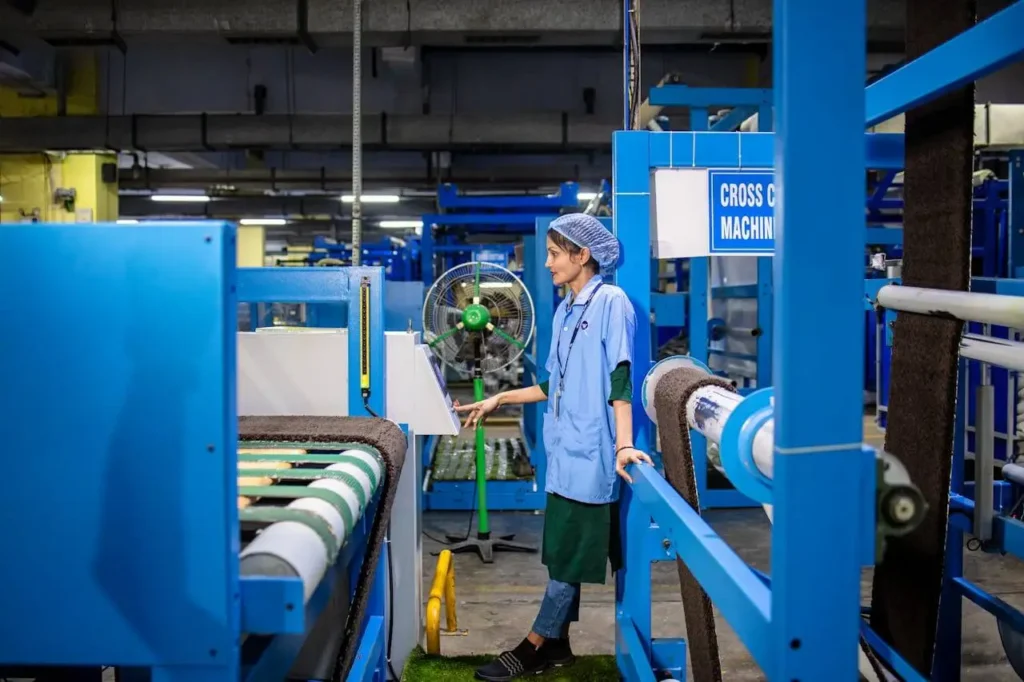Artificial intelligence is changing how many industries operate worldwide. The manufacturing industry is no exception. As technologies advance, AI is becoming an important part of many production processes and operational strategies. AI use cases in manufacturing are growing every day. Manufacturers are using AI systems to improve efficiency, reduce costs, speed up processes, and improve product quality. Through these AI solutions, manufacturing is becoming more adaptive, and we are seeing smarter ways of solving long-standing industry challenges.
The Growing Role of AI in Manufacturing

Modern manufacturing involves production lines, global supply networks, and the constant pressure to improve quality and efficiency. In this environment, AI is being integrated as a central system that brings together data from machines and business systems to create a more connected and responsive operation. Thanks to these digital technologies, today’s factories are more dynamic than ever and are no longer isolated facilities operating on fixed routines. Factories use AI to collect and analyze data in real time, allowing machines to work in harmony and respond to changing conditions.
Besides the benefits to operations on the factory floor, AI strengthens supply chains by introducing intelligence into inventory management and logistics. This integration of AI allows manufacturers to anticipate changes and respond quickly to disruptions.
While traditional automation follows a programmed set of rules, AI can learn from data and suggest improvements based on patterns it identifies.
Real-World Use Cases of AI in Manufacturing
Let’s look at some ways in which AI in manufacturing is making a difference in the industry.
Predictive and Prescriptive Maintenance
One of the most beneficial AI use cases in manufacturing is predictive maintenance. For years, maintenance was done on a scheduled basis regardless of the actual condition of the machines. By analyzing data from sensors in the machinery, AI models can now predict when equipment is likely to fail or require servicing. This foresight means that manufacturers can approach maintenance activities proactively, preventing expensive unplanned downtime.
Alongside prediction, prescriptive maintenance takes it a step further by recommending specific actions to address emerging issues. The combination of these approaches indicates a shift from reacting to problems to proactively avoiding them, dramatically changing the nature of equipment management and reducing disruptions.
AI-Powered Quality Control and Defect Detection
Maintaining high product quality is one of the most important goals for manufacturers. Human visual inspection can be challenging and is prone to inconsistencies or tiny missed defects. AI-powered quality control systems can now perform this task with accuracy and speed. Machine learning algorithms identify patterns associated with faults, making early intervention possible before defective products move further down the line.
AI also supports continuous improvement by revealing subtle process variations that impact quality. This means manufacturers can refine their operations consistently, resulting in higher standards and reduced waste.
Intelligent Supply Chain and Demand Forecasting
Supply chains benefit significantly from AI technology. AI uses large amounts of data, ranging from market trends to supplier performance, to forecast demand more precisely. Accurate demand forecasting helps avoid overproduction or low stock. This makes managing inventory levels much easier and reduces costs.
Additionally, AI improves supply chain visibility by predicting potential disruptions, such as delays or shortages, which allows companies to respond faster. This leads to improved customer satisfaction and consistent, timely deliveries.
Generative AI and Design Automation
Generative AI is transforming product design and engineering. By using machine learning models that generate new design concepts based on specified criteria, manufacturers can explore new solutions quickly. This speeds up the design phase and leads to more efficient products with fewer faults.
Design automation through AI reduces manual tasks, giving engineers more time to focus on strategy and problem-solving. It also supports large-scale customization allowing unique customer requirements to be met without compromising productivity.
Sustainability and Energy Optimization
Sustainability and waste are significant concerns for many manufacturers, and AI plays an important role in achieving these goals. AI algorithms analyze energy consumption patterns and environmental data to identify opportunities to make processes more efficient and sustainable. These insights help to reduce energy use and lower carbon footprints.
Manufacturers are also using AI to improve production schedules and resource allocation, lowering the environmental impact while maintaining performance. This responsible approach meets growing regulatory expectations and supports corporate social responsibility goals.
The Impact of AI on Manufacturing Operations

The integration of AI in manufacturing has many operational benefits, including:
- Faster decision-making through real-time data analysis
- Increased automation of routine tasks
- Cost reductions by preventing downtime and improving allocation of resources
- Better product quality through precise defect detection
- Improved supply chain resilience with accurate forecasting
- Faster innovation through generative design tools
- Support for sustainability initiatives through energy optimization
These advantages collectively contribute to a more agile and future-ready manufacturing landscape.
Ready to Get Started with AI in Manufacturing? Contact Us Today.
The path to AI adoption requires expert guidance and a clear strategy. Partnering with experienced professionals ensures smooth implementation and allows you to access all the benefits AI technology offers. Get in touch to position your manufacturing operations for sustained success.
Where Does AI in Manufacturing Stand?
AI is changing the manufacturing sector by integrating intelligence across production, quality control, supply chain management, design, and sustainability efforts. These real-world applications demonstrate significant improvements in efficiency and cost-effectiveness. As technologies, and the sector itself, continue to grow and change, embracing AI plays a central role in its success.
FAQ
How Does AI Improve Maintenance Processes in Manufacturing?
AI offers predictive and prescriptive maintenance by analyzing real-time data from equipment sensors to forecast failures and recommend appropriate actions.
In What Ways Does AI Improve Product Quality Control?
AI-powered systems use machine learning algorithms to detect defects more accurately and quickly than traditional methods, enabling early identification of quality issues and continuous process improvements.
What Role Does AI Play in Bettering Supply Chains?
AI improves supply chain management through precise demand forecasting, risk prediction, and enhanced visibility.
Is AI Integration a Good Option for Small and Medium Sized Manufacturing Companies?
AI integration can benefit manufacturing companies of all sizes. AI technology can be scaled easily based on the needs of each company.
Recent Posts
-
Published on: December 16, 2025
-
Published on: December 2, 2025
-
Published on: November 25, 2025








